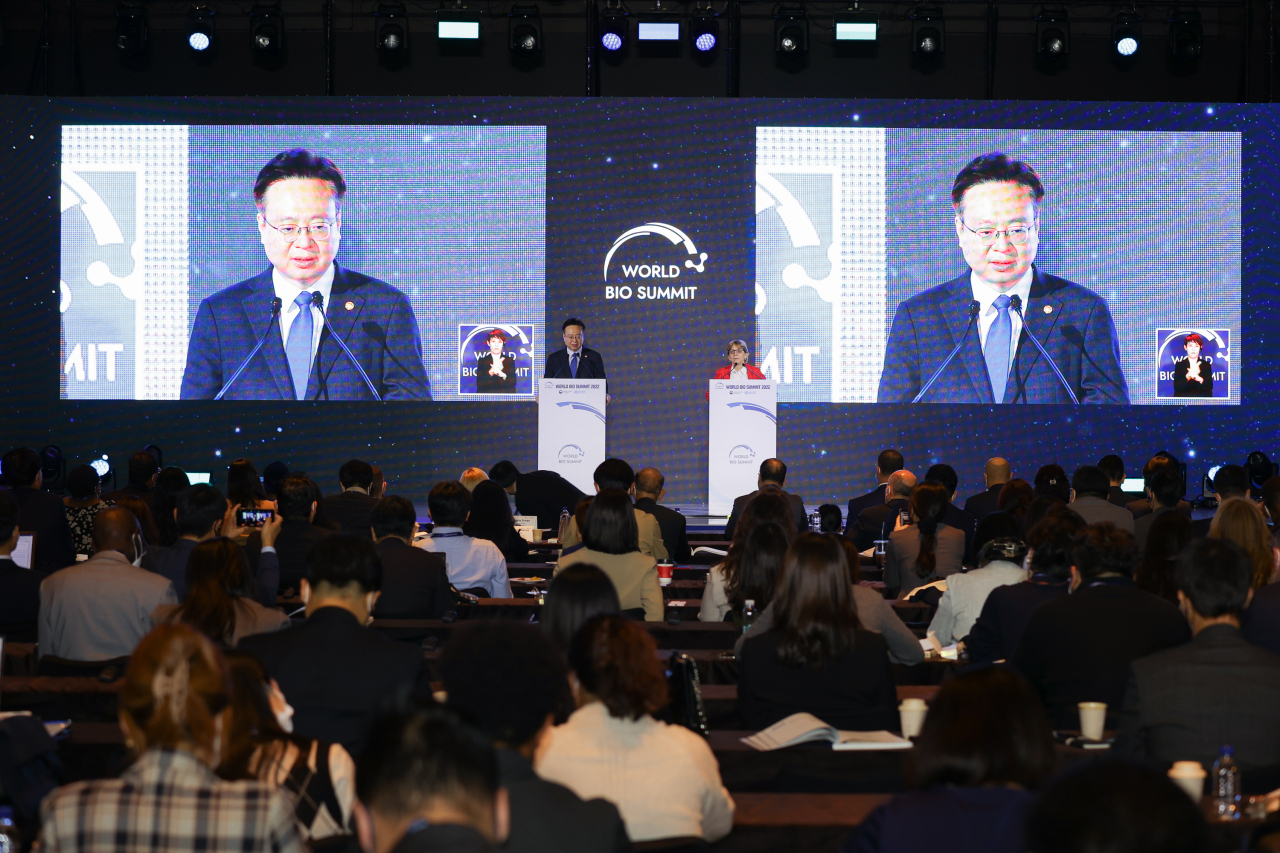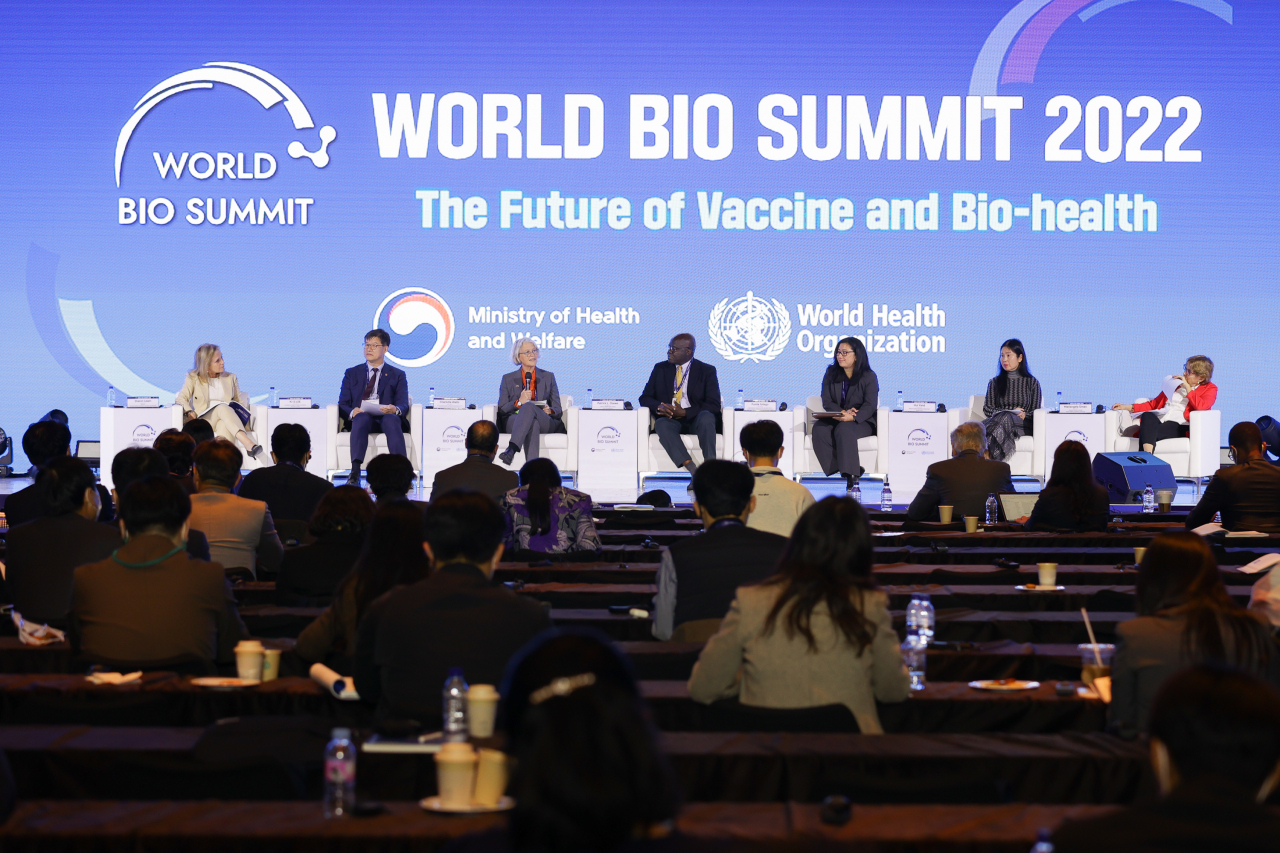World Bio Summit to explore new ways to fight potential pandemic
By Lee JaeeunPublished : Nov. 20, 2023 - 14:20

The 2023 World Bio Summit, jointly hosted by the South Korean government and the World Health Organization, kicks off Monday for a two-day run in Seoul to explore ways to strengthen capacity to handle another potential pandemic.
Taking place at the Conrad Seoul Hotel, over 200 health policymakers, bio and medical experts as well as business representatives from around the world are to participate in the summit in its second year, according to the Ministry of Health and Welfare.
Under the theme of “Strengthening capacities to respond to pandemic: Preparation of human resources, businesses and civil society,” the experts will share their insight on ways in which the workforce, businesses and civil society can be adequately prepared so that we can prepare for future pandemics, reflecting on lessons learned from the recent coronavirus pandemic experience.
In May 2023, the WHO eventually declared the lifting of the public health emergency of international concern against COVID-19. However, the pandemic instructed the international community of the need to establish a response system for when another pandemic occurs preemptively, according to the Ministry of Health and Welfare.
“With all these efforts, we overcame the pandemic. However, it also left a lesson that we should prepare for future crises in advance," the South Korean Health Ministry said in a statement. "Now that we have escaped the global health crisis, it is timely and appropriate to expand production and development capabilities for vaccines and treatments and establish a global supply chain.”
Over the past three years of the pandemic, companies in advanced nations rapidly developed vaccines and treatments amid strong international health cooperation to overcome the crisis of COVID-19. The world also has continued to address global inequality in vaccines through large-scale investment and network establishment at the government and international organization levels, the ministry noted.
To this end, the ministry said, international discussions are needed to establish a systemic regional vaccine supply chain by designating "regional hubs" that can be central points for research, development and production of regional vaccines, and the 2023 World Bio Summit would be the starting point of those discussions. As a venue for this discussion, the ministry explained that the 2023 World Bio Summit will be a platform for sharing views on human resources, companies and civil society in preparation for the next pandemic.
“We will learn lessons we have learned in the process of responding to COVID-19 and seek ways to prepare for future pandemics at the international level,” the ministry added.
The 2023 World Bio Summit comprises four sections: “Strengthening Vaccine, Pharmaceutical and Diagnostics Manufacturing and Regulatory Oversight to Build Capacities for Pandemic Response,” “Accelerating Pandemic Therapeutics Development and Manufacturing,” “International Support Strategies for the Growth of the Global In Vitro Diagnostics Industry and South Korea's Role” and “Strengthening Global Preparedness Through CEPI’s 100-Day Mission.”
Cho Kyoo-hong, South Korea’s minister of health and welfare, was to deliver his opening remarks in person, with WHO chief Tedros Adhanom Ghebreyesus to deliver his opening speech online. Following them, Fatima Yasmin, vice president of the Asian Development Bank, Jane Halton, chair of the Coalition for Epidemic Preparedness Innovations Board, and Kenya’s Minister of Health Susan Nakhumicha Wafula are to offer congratulatory remarks.
The first section will be held on the first day of the summit, and the other three will be held on the second.
Only when clear regulatory guidelines and requirements are ensured can the development of safe and effective vaccines within each country be promoted, therefore participants will seek ways to carry out essential regulatory functions properly in the first session.
In the second session, participants from across various fields, including governments, international organizations, international foundations and global experts, as well as representatives of bio industries, will present future strategies and visions related to emerging infectious disease therapeutics and share policies on global investment for pandemic preparedness.
During the pandemic, Korea’s proactive establishment of nationwide COVID-19 diagnostic testing through close collaboration between government, industry, relevant academic societies and other stakeholders garnered attention globally. Korea's strengths in diagnostic testing were significantly recognized, too. Since there is an increasing awareness of the role Korea can play on the global stage, in the third session participants will explore Korea's expected role in the global health care landscape, considering its successful use of diagnostics to respond to infectious diseases, its potential in the diagnostic testing industry and its potential to contribute to global health equity.
Finally, in the fourth session, participants will focus on the implementation of CEPI's 100-day mission to respond swiftly and effectively to epidemic and pandemic infectious diseases threats. This mission will foster collaboration among key stakeholders, including industry, academia, governments and international organizations. This session aims to present the mission and gather support and commitment from various stakeholders, according to the Health Ministry.
In addition to those sessions, the "Global Business Lounge" will operate for networking at the summit. Here, officials from international organizations and domestic vaccine, pharmaceutical and bio companies can meet and network to spur cooperation.
The 2023 World Bio Summit marks the second iteration. Last year, the first World Bio Summit kicked off in Seoul, co-hosted by the Korean government and the WHO. This large-scale event came as the unprecedented COVID-19 pandemic has highlighted the importance of cooperation between countries.
Furthermore, the WHO designated Korea as the global biomanufacturing training hub to support the transfer of pharmaceutical technologies to low-income and middle-income countries last year. The courses teach mRNA vaccine manufacturing skills and basic knowledge of vaccine development and production. With the designation, South Korea has determined to take the lead by holding the annual summit.

The summit has already notched several achievements.
At last year's first summit, health ministers from six countries, including South Korea, the United States, Nigeria and Germany, adopted the Seoul Declaration, committing to thoroughly preparing for future pandemics based on international cooperation.
“The Korean government believes that the World Bio Summit will be a venue where innovative ideas are flowing, answers for old conundrums are found and pioneering visions for the bio industry are building. The Korean government and its co-host, the WHO, will contribute together to reassemble global capacity in the field of bioscience,” Health and Welfare Minister Cho said.
“The Korean government plans to lead the agenda of global vaccines and biotech industry by holding the summit every year and further use it as a stepping-stone for the leap forward as a leading country in the bio industry,” an official from the Health Ministry said.






![[Weekender] How DDP emerged as an icon of Seoul](http://res.heraldm.com/phpwas/restmb_idxmake.php?idx=644&simg=/content/image/2024/04/25/20240425050915_0.jpg&u=)




![[Music in drama] An ode to childhood trauma](http://res.heraldm.com/phpwas/restmb_idxmake.php?idx=644&simg=/content/image/2024/04/25/20240425050929_0.jpg&u=)







![[Herald Interview] Mistakes turn into blessings in street performance, director says](http://res.heraldm.com/phpwas/restmb_idxmake.php?idx=652&simg=/content/image/2024/04/28/20240428050150_0.jpg&u=20240428174656)
